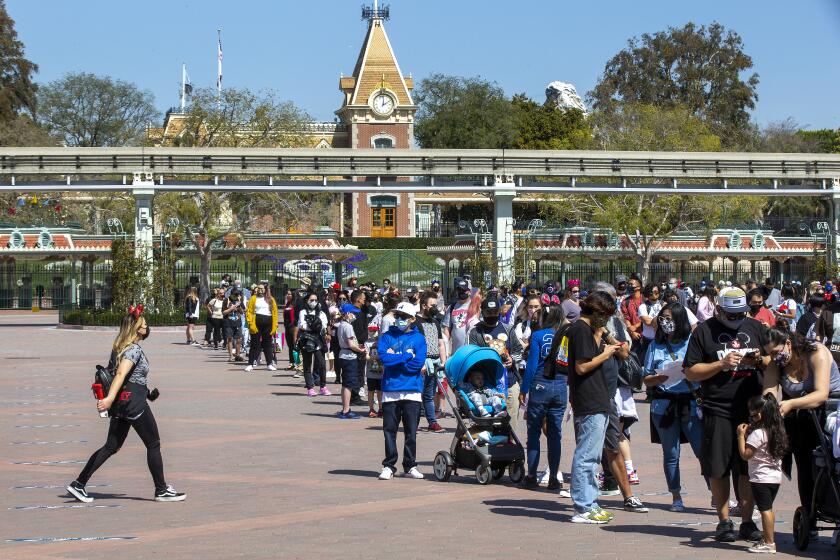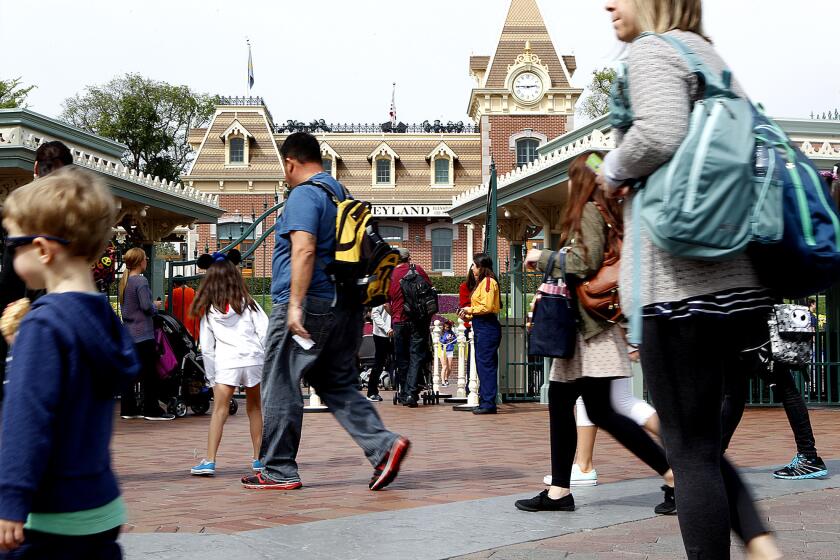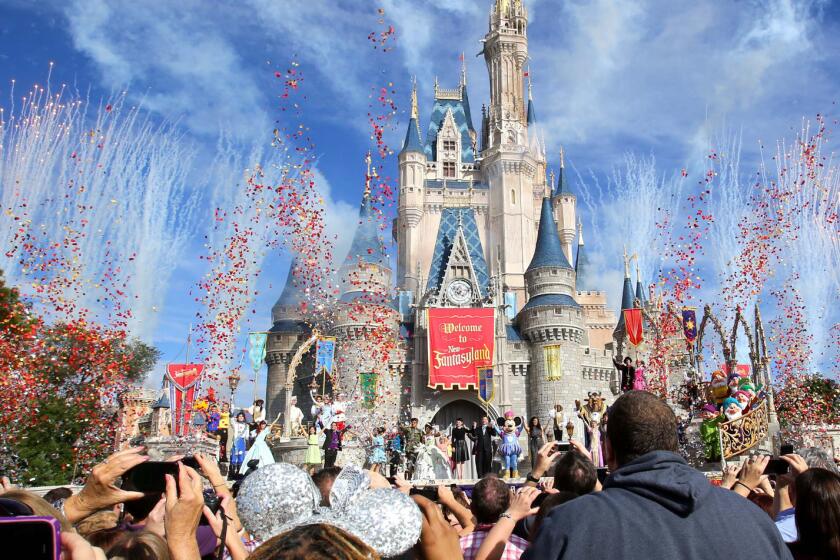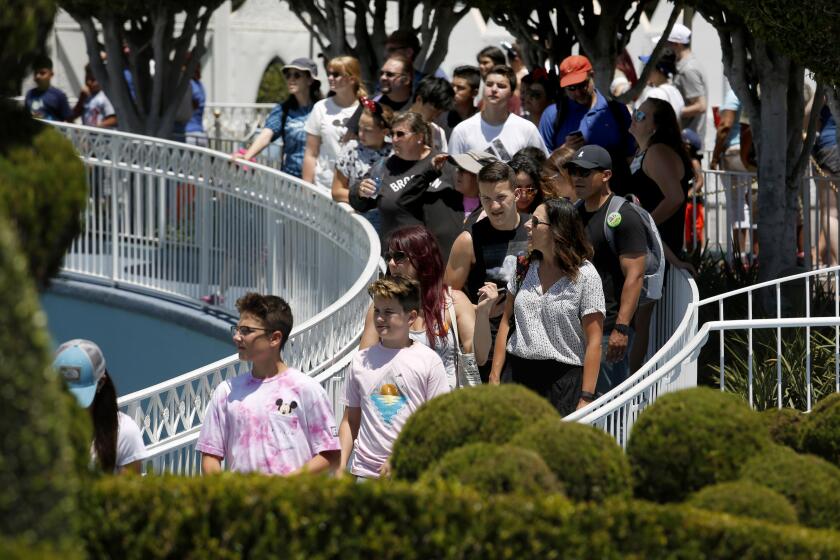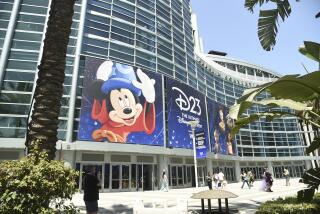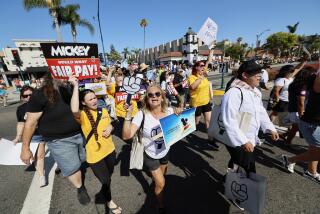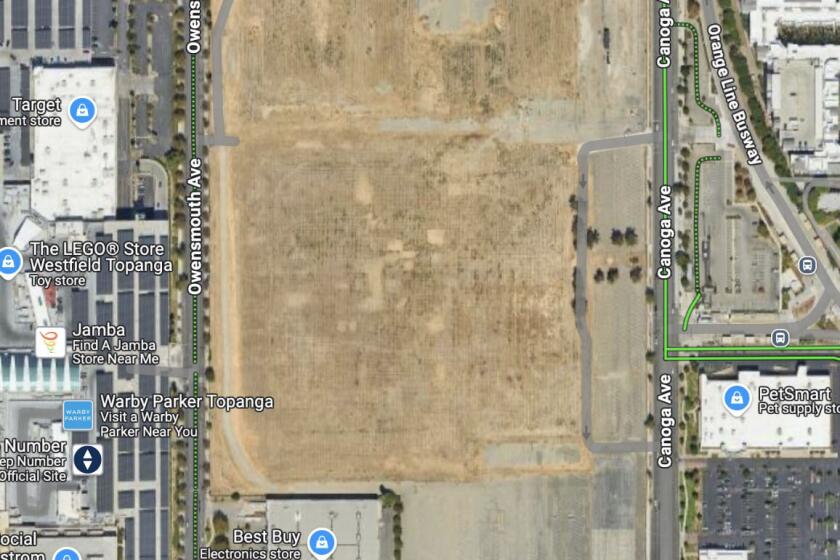Disneyland fans with disabilities enraged by changes: ‘We had the worst day ever there’
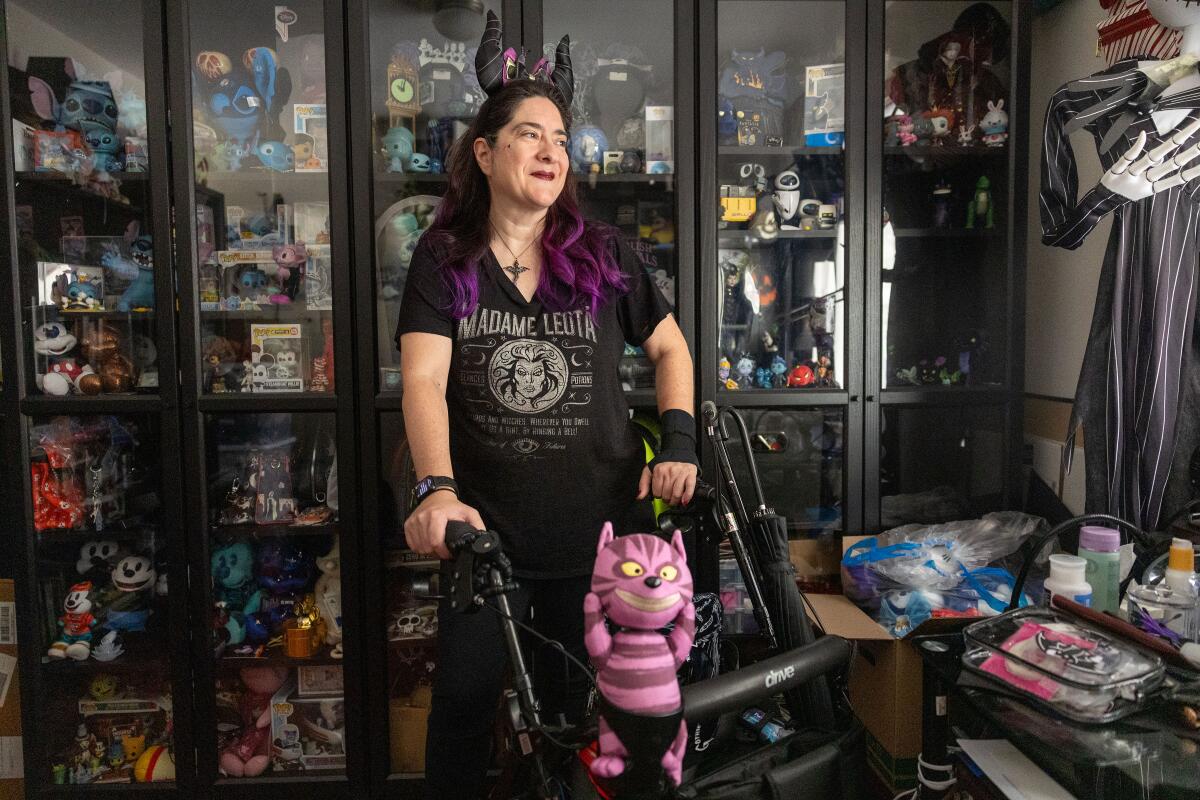
Less than two hours after being dropped off at “The Most Magical Place on Earth,” Florida resident Paula Roland tearfully called her husband to take her and their son Noah home.
That June 5 was supposed to be a once-in-a-lifetime experience at Disney World’s Magic Kingdom. But days earlier Noah — a nonverbal autistic child with sensory processing disorder — had been denied Disney’s Disability Access Service, or DAS, pass. The 8-year-old struggles to stand in line for more than 15 minutes, and the pass would have provided him with shorter wait times at attractions.
Shortly after entering Disney World and attempting to wait in line with his family, Noah suffered an autistic meltdown — an involuntary and intensely emotional response to an overwhelming situation. He spent most of his time at the park being soothed by his mother inside a gift shop.
“It’s hard to come back from that point,” Roland said. “We had the worst day ever there.”
The child joins various individuals The Times spoke to who say they were denied a DAS pass after Disney changed the program earlier this year to eliminate overuse and potential abuse of the popular system.
Some feel betrayed by the company known for its inclusivity and are reconsidering patronizing the parks. Others have gone a step further, questioning whether Disney’s changed DAS policy complies with the law. Disney says it does comply.
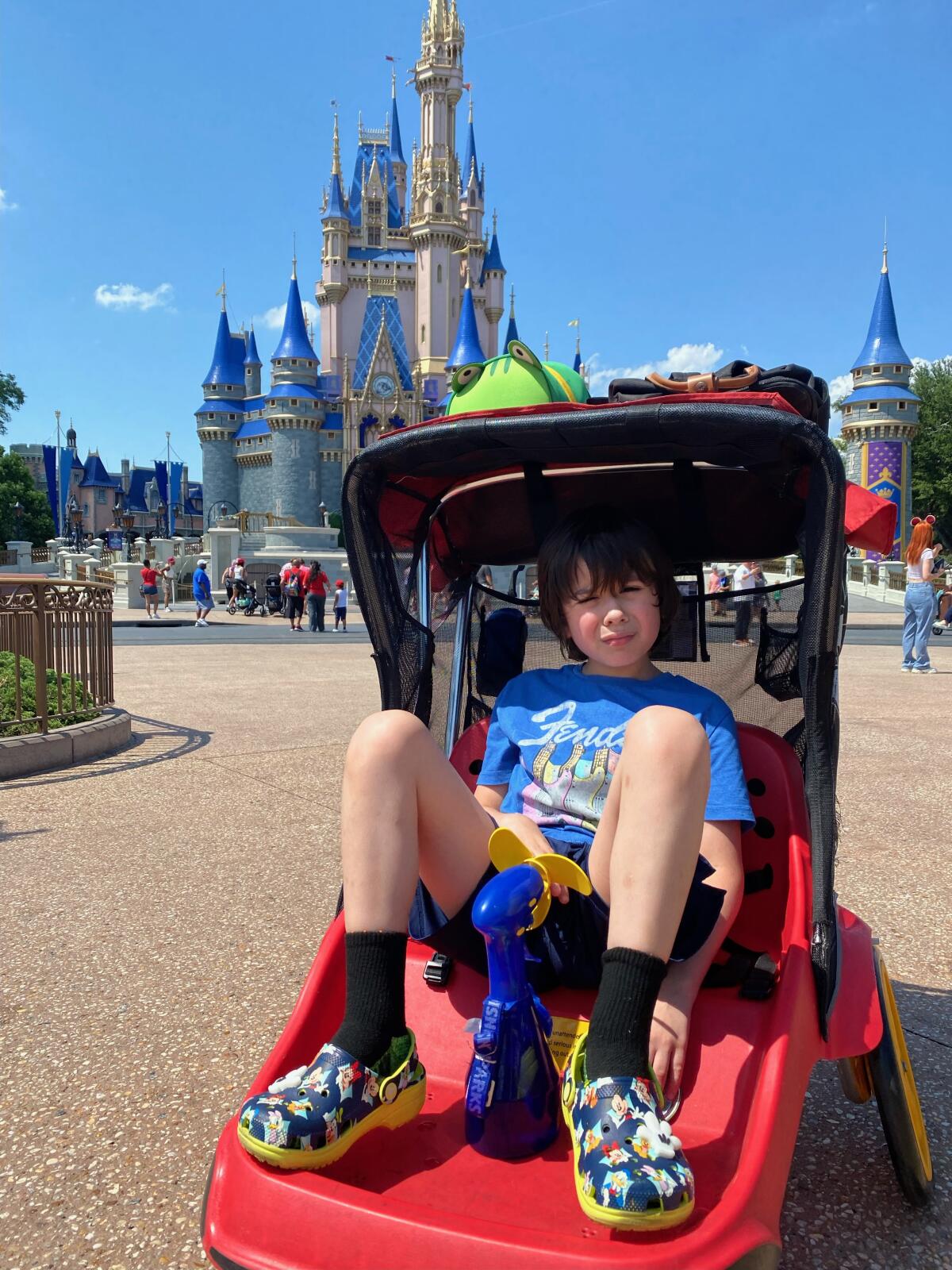
‘Deeply personal’
Northridge resident Rosie Keiser “cried and shook” during her DAS screening outside Disneyland on July 14.
The cast member she spoke with was “kind and patient,” she said, but the questions were “deeply personal.” Still, she was able to obtain the pass, allowing her to board some rides outside the regular line. She said she was “one of the lucky ones.”
The DAS pass, created in 2013, allows users at Disneyland and Disney World to avoid standby lines. A pass holder registers on the park app or with a guest relations member for a specific ride and is given a return time.
Other parkgoers pay extra — up to $35 — to join the Lightning Lane, with normal wait times of five to 25 minutes, according to various bloggers who track times. DAS pass holders can use the Lightning Lanes for free.
That can mean a drastic difference in wait times for some rides.
Disneyland guests wanting a DAS pass can speak online with a park representative two to 30 days before arrival, or they can meet with a guest relations employee at the park.
Keiser, diagnosed with multiple sclerosis in 2007, became permanently disabled in 2009. She struggled to leave her house, calling herself a “hermit.” But in 2015, after watching old family movies of the Main Street Electrical Parade, she vowed to return to the park for the first time since 1988.
Since then, she’s visited dozens of times.
“You do have to beg for the service,” Keiser said of the DAS interview process.
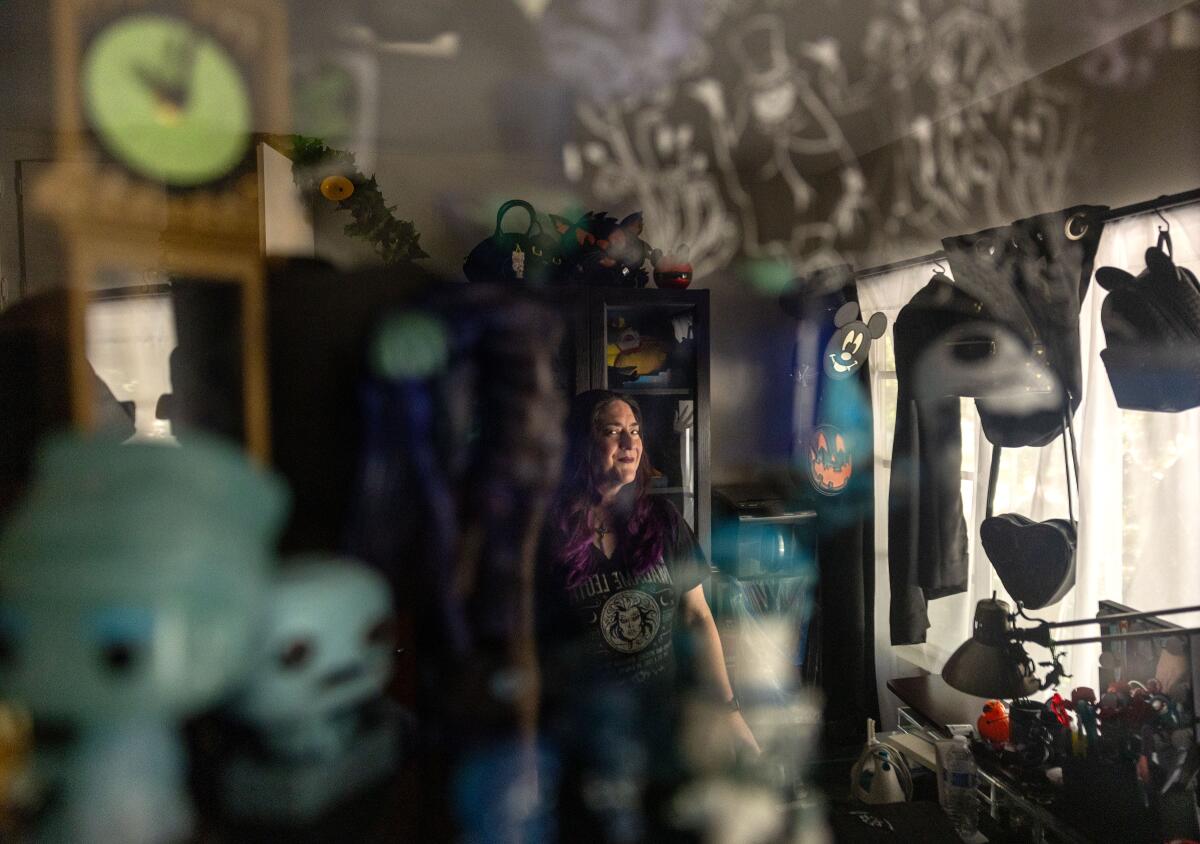
Disney cites overuse
A Disneyland spokesperson said changes to DAS were necessary because of overuse.
The company said usage of the system had tripled since 2019, though Disney did not respond to requests for specific figures.
Disney ‘reset’ elements of its Disability Access Service program, or DAS, that has become Orlando’s and Anaheim’s most popular service, a spokesperson said.
The spokesperson, who asked not to be named because of Disney policy, said the DAS pass was just one of several accommodations Disney offers but would not comment on whether the company felt the system was being abused.
Examples of misconduct to avoid Disneyland’s notorious lines date to before DAS, when guests with previous versions of disability accommodations reportedly sold access to healthy families. Since the system’s introduction, parkgoers have spoken out on Reddit and Disney forums about people abusing the system, while debates have raged over the merits of extending DAS to people suffering from health problems such as irritable bowel syndrome and nerve pain.
Florida-based travel agent Shannon McEvoy specializes in vacations for families and individuals with disabilities and special needs. She told The Times that she’d fielded DAS questions from those looking to cut lines.
“I’ve had healthy people reach out and ask how they can get a DAS service pass,” McEvoy said.
The changes, which went into effect May 20 at Disney World and June 18 at Disneyland, reduced eligibility. The accommodation is for “a small percentage of guests who, due to a developmental disability like autism or similar, are unable to wait in a conventional queue for an extended period of time,” according to Disney’s new guidelines.
Previous standards were much broader: “guests who have difficulty tolerating extended waits in a conventional queue environment due to a disability.”
Disney changing policy that lets guests with disabilities skip lines
Changes also include increasing the time the pass is good for, from 60 to 120 days, and decreasing the number of guests who can accompany a DAS pass holder in a Lightning Lane from five to three.
Disney said it was adding cast members to help guests better utilize the park’s services and bringing in a third-party medical consultant to help determine DAS eligibility.
‘Disney sends a clear message’
A group calling itself DAS defenders started an online petition asking Disney to reverse course.
“By excluding many disabled individuals from these cherished experiences, Disney sends a clear message that the rights and needs of the disabled community can be overlooked,” the group wrote in its petition, which has 31,000 signatures.
DAS defenders claim Disney is now excluding “cancer patients, veterans with PTSD, Parkinson’s, Multiple Sclerosis, those with rare diseases and more.”
A Disney spokesperson said other accommodations exist to meet the needs of guests who have disabilities but are rejected for the pass; according to the park’s website, those include a sensory experience guide to indicate which parts of the park have loud noises, darkness and bumpiness, which rides are fast and which lift off the ground. Disney also offers sign language interpreters, wheelchair and scooter rentals, assistive handheld captioning and video captioning on some rides, and dialogue and narration of scripts on others.
Park accommodations also include allowing a stroller to carry a “disability tag” that permits it to be pushed through the standby lines; otherwise, strollers have to be parked while riders stand in the queue.
People with disabilities like me shouldn’t have to go to court to be able to enjoy ‘The Happiest Place on Earth.’
In April, Disney publicized its “return to queue” process, which allows a party to hold a place in line for a guest with disabilities. Also, 16 of the roughly 70 rides at Disneyland and Disney California Adventure offer a “location return time,” typically reserved for those using wheelchairs. Another 24 have the Lightning Lane option available for purchase. A Disneyland spokesperson said the Lightning Lane was “not related to or intended to replace disability accommodations.”
“To our guests with disabilities, we are listening and continuing to work to help you have an enjoyable experience when visiting Disneyland Resort,” Disneyland Resort spokesperson Jessica Good said in a statement. “We understand that this may be an adjustment for some of our guests and are focusing our efforts on additional training and staffing, as well as providing increased awareness of our enhanced suite of accessibility tools to best meet guests’ unique needs.”
‘Certain populations’ benefit
But the changes by Disney have left members of the disabled community feeling alienated, say Laura Rothstein and Julia Irzyk.
The mother-daughter legal team co-authored “Disabilities and the Law,” which focuses on the Americans With Disabilities Act. Rothstein, professor of law emeritus at the University of Louisville’s Brandeis School of Law, says disabled people denied DAS passes have a credible argument that Disney is not complying with the ADA.
“They’ve made an accommodation arrangement for certain populations,” she said, “and don’t have any realistic reasonable accommodation mechanism for other disabilities.”
Rothstein said the ADA requires an individualized assessment of a “reasonable accommodation” request and an equitable discussion before making a determination.
She feels the DAS pass interview process is lacking because Disney does not accept medical paperwork.
A Disneyland spokesperson said that Disney understands its “obligations under all applicable laws, including the ADA, and are in compliance.”
Walt Disney Co. faces lawsuits saying the way it allows disabled visitors access to rides is unfair to people with autism and other cognitive disabilities.
The DAS pass overhaul is personal for Irzyk, a Sherman Oaks-based talent agent and attorney who specializes in special education law and employment discrimination.
Irzyk, who is afflicted with lupus, the blood circulation disorder POTS and degenerative disc disease, successfully fought for a DAS pass in October. She frequently visits the park masked and in a wheelchair, and says Disney policy already bans DAS pass cheaters for life.
Both Irzyk and Rothstein also say Disney should revise its policy of mandating that parties purchase tickets — which are nonrefundable — before applying for a DAS pass. They think it’s unfair for families to arrange a trip, spending hundreds or perhaps thousands of dollars, and then be denied a pass.
A Disney spokesperson said guests can discuss services, including DAS passes, up to 30 days ahead of a visit.
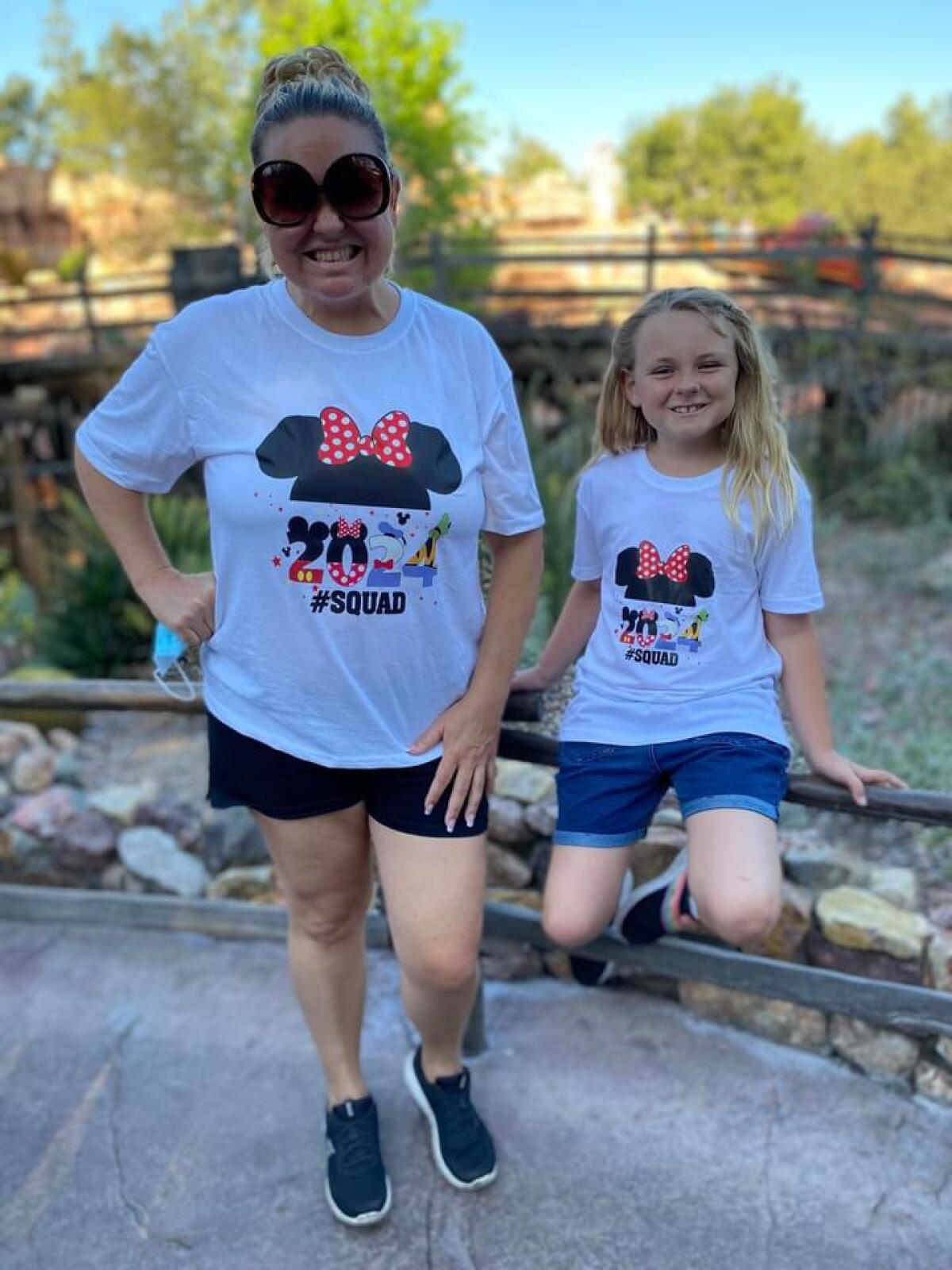
‘Have a magical day’
Every half-hour for seven hours, Farrah Evagues refreshed her smartphone screen as she waited for her DAS appointment.
She finally got the interview, was denied a pass and told “to have a magical day.”
Undeterred, she repeated the process the next day with the same results.
Seven hours is nearly twice as long as the 42-year-old single mother spends in a chemotherapy session. Evagues is battling Stage 4 small bowel adenocarcinoma.
After the second rejection, there were tears from Evagues and her daughter, Brooklyn. The girl vowed to “never go to Disneyland again.”
Evagues said that during the interview, she was told by a cast member that — in lieu of DAS privileges — her 8-year-old could wait in line alone under the “return to queue” option for some rides; on others, they could use the “location return time” accommodation.
Evagues got her cancer diagnosis in February and was given six months to live. She underwent surgery to remove tumors in 16 places around her stomach and intestines. She often has trouble standing, moves with a walker and needs frequent breaks.
Despite not getting a DAS pass, she visited Disneyland with her daughter in July. When the pair reached Space Mountain, they were told only the “return to queue” service was available. Evagues said this accommodation was “not possible” since she didn’t want to leave her daughter alone in line.
She pleaded at the ride, was sent to the DAS booth outside the park entrance gate and then to Disneyland City Hall, where she was rejected for a pass again.
“This used to be a very magical place for me,” Evagues said. “I don’t know when my last trip will be, but if this is it, it’s a terrible way to finish.”
More to Read
Subscriber Exclusive Alert
If you're an L.A. Times subscriber, you can sign up to get alerts about early or entirely exclusive content.
You may occasionally receive promotional content from the Los Angeles Times.
